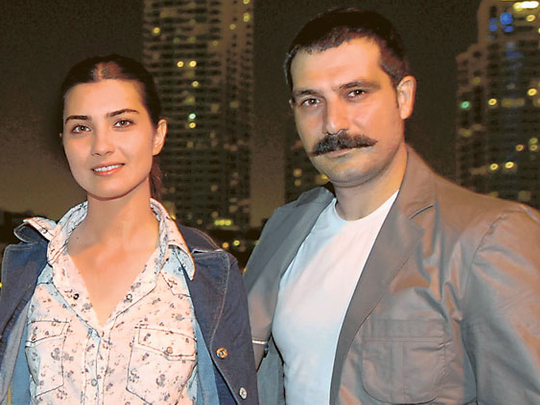
The remarkably popular Turkish dramas are increasingly becoming a source of delight for sponsors and advertisers on Arabic channels.
The demand for drama, which has become a target for several Arab channels in the past few years, has increased in recent months with the expansion of its broadcasting map, after overcoming some accent barriers. The demand for Turkish drama has increased, especially with the decreasing output of the two important TV production cities in the Arab region, Cairo and Damascus, due to the political turmoil in both countries for more than a year.
But this spreading out has its price. As the economic rule goes, an increase in demand leads to an increase in prices. Some experts in the industry believe that the increasing prices of Turkish dramas will eventually lead to a shift in demand. High prices have put forward the option of searching for a new window of profits for TV channels, they said.
Several years back, "I bought a one-hour (one hour of copyright) Turkish drama for $600 [Dh2,203] or $700. Today, there are [parties] who are willing to pay $40,000 for one-hour [dramas]," said Adeeb Khair, general manager and owner of Sama Art Productions, a Syrian TV production company which dubs Turkish dramas into colloquial Syrian Arabic.
"This has opened the door for Turkish [production] companies to reconsider their prices and say it won't sell for less than $30,000 [for a one-hour show]. This will create a problem. Who will buy and take such a risk?" Khair told Gulf News. His Damascus-based company has already dubbed nearly 60 Turkish dramas in the last four years.
The price problem doesn't seem to be a recent one. Turkish drama series, some of which are soap operas, are already being aired in most Arab countries, after some language barriers have been removed.
"Egypt accepted to show the series in Syrian slang. Also, there was an acceptance in Lebanon to air Turkish dramas …. The demand grew and this is due to the great success of the series such as Nour and Forbidden Love," Khair said.
Nour, which is named after the main character in the dubbed Turkish soap opera which was shown on the Saudi-owned MBC satellite channel in 2008, immediately became a hit. The high ratings it got were partly due to its unconventional use of colloquial Arabic. Non-Arabic dramas too have been dubbed earlier in classical Arabic.
The series, which received poor ratings when it was first shown in Turkey in 2005, revolves around a family in which a rich old man strives to ensure his family members, mainly his grandchildren, focus on the family business and maintain cohesion. Apart from family relations and values, the series also highlights marriage and love.
The immense popularity of the series, among all categories of society, became a topic of discussion among many social science and psychology experts. One of the reasons given for the success was the high quality of production.
"The last two episodes of Nour, shown on August 30, 2008, attracted 85 million viewers in the Middle East and North Africa [Mena] region, out of which 50 million were females," said Mazen Al Hayek, MBC's official spokesperson and the group director of PR, marketing and commercial.
Viewership
On a daily basis, the series has been watched by nearly 30 million viewers, he said.
According to figures made available to Khair, the last episode was watched by 92 million viewers.
So popular was the series that even the former Lebanese Prime Minister Sa'ad Al Hariri was caught off-guard during a meeting with a group of orphans during Ramadan a few years ago. When he asked them what they would like to have most — anticipating replies such as bicycles or toy cars — he got a totally different response from them — they wished to meet Nour. Al Hariri then asked his advisers to inquire about her and also got in touch with MBC.
"We created something called the Turkish drama jar on Arab TV," Hayek told Gulf News in a recent interview.
MBC, which started broadcasting Turkish dramas in 2008, has telecast nearly 20 series. The others are shown on Arabic satellite channels such as Abu Dhabi TV and Dubai TV.
Another Turkish drama popular in Arab households is Forbidden Love. It was among the top 10 series in Egypt last year.
However, the increasing price of Turkish dramas "will lead to an increase in the cost and the price of advertisements and this makes me conclude that the search for alternatives has surely started," said Khair.
But other media industry professionals say that Turkish dramas will not be substituted. It didn't substitute any other drama in the first place, it came as an "addition", Hayek said.
Besides the use of Syrian spoken Arabic, the high production value of the Turkish series is among their success factors in Arab households.
In the 1990s, Mexican telenovellas, dubbed in classical Arabic, dominated most Arab TV channels. Yet viewers felt "disconnected" because of the use of classical Arabic.
Though content is king, proper scheduling is very important, too.
Most of the Arab satellite channels allocate part of their prime time slots to Turkish dramas. After getting good ratings, channels do not find it difficult to bring in advertising, media experts said.
"The other thing is that channels can buy [in the case of Turkish dramas] a finished product. So they know what they are buying, unlike the Ramadan series, where they buy a concept, or an idea, or a script, but have not seen the finished product," said Veda Rizk, a Dubai-based TV and marketing consultant.
Exclusive rights
"In general, leading channels buy these series on an exclusive basis to guarantee their advertisers that people will watch it on their channels," she said.
The duration of Turkish dramas, some of which can exceed 100 episodes, also helps bring in advertising as viewers get hooked to the series and become loyal to the channel airing the series. "Once you get someone hooked, it is not just 20 or 30 episodes, it is 60 or 70 or maybe 90 episodes, so you actually guarantee an audience for a long time," Rizk said.
"It is a win-win situation" for the advertisers and TV channels, she said.
Target audience
Some Turkish dramas are more appealing to women while some action series attract male audiences and this helps attract different types of advertisers for different viewerships, industry experts said.
But with such lucrative opportunities, for advertisers and TV channels, some channels enforce their own regulations. For example MBC, which "captures the lion's share of the commercial market on Arab satellite TV", is adhering to its rule of allocating only 12 minutes every hour for advertisements during each drama it shows, Hayek said.
Usually they are divided into three or four cuts. "We abide by [this rule] religiously," she said.
While satellite channels could buy these products, the other channels could still buy these for their non-satellite broadcasts.
Depending on the contract, Turkish dramas can also generate income after they have been telecast. The series can be re-released on DVD, as was the case with Nour.
Also, the channel which has paid for the copyright of the series can sell it to other broadcasters, mainly local channels, or give it to other TV companies.
Turkish drama TV series now pose a challenge to Arabic drama, Hayek said.
Costs of nearly $100,000 per hour for high quality Turkish series are forcing Arab production companies to rethink the standards of their own productions, which cost $35,000 to $40,000.
"It is a big challenge, to produce on a bigger budget, raise the standards and market a drama to get where the Turkish are today."
Kivanc Tatlitug, widely known in the Arab region as ‘Mohannad', became one of the most famous symbols for his country, exactly like Tuba Buyukustun or ‘Lamiss'.
Both of them are among many Turkish actors and actresses who are popular in the region after dramas featuring them were telecast on Arabic channels. And if Turkey was looking for a powerful element to spread its culture and art, and later its political message, it won't find better messengers than these artists.
Time magazine recently described the export of Turkish soap operas as the "secret of Turkish Prime Minister Recep Tayyip Erdogan".
Turkish newspaper Hurriyet Daily News was quoted as saying that the soap operas have increased the country's influence abroad, especially in the Balkans and the Middle East, furthering the so-called soft power of Turkish diplomacy.
According to Hurriyet, more than 100 Turkish TV series have been watched in more than 20 countries this year, earning more than $60 million.
The number of tourists to Turkey from Arab and non-Arab countries has noticeably increased the airing of Turkish TV drama series on Arab satellite channels. The tourism boom in the already popular holiday destination, however, has nothing to do with the natural attractions and history of the land.
In 2008, the Turkish ambassador to Saudi Arabia was quoted as saying in an interview: "Turkish drama has succeeded in boosting the number of Saudi tourists from 30,000 last summer to 100,000 this year."
A Jordanian newspaper quoted a travel agent as saying, "After we added the palace where the shooting of Nour took place on the tour schedule, there has been a 20-25 per cent increase [in the number of people going to Turkey]."
In 2011, Istanbul was also one of the top holiday destinations for Macedonians, who were eager to see the city where their "favourite" Turkish soap operas originate, according to the Balkan Insight report.
Agencies that offer tours to the sets of these heart-rending TV novellas say these dramas have taken Balkan audiences by storm, saying business is booming, a press report said.
"People are simply curious and they want to see," said Sonja Samardziska from the Skopje-based Skaut tourist agency, adding, "We already have two full buses booked and we are expecting more."
The agency offers a tour of the live sets of the soap opera Yaprak Dokumu, or Falling Leaves, a love and crime melodrama centred on the life of a family in Istanbul.Elsewhere in the Balkans, this show, currently airing in Macedonia, "has broken viewing records", one press report said.











